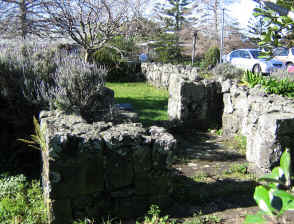Difference between revisions of "St Thomas's Ruins - Visit"
(→St Thomas's Ruins) |
|||
| Line 25: | Line 25: | ||
'''Location:''' | '''Location:''' | ||
| − | + | Corner of Kohimarama Rd and St Heliers Bay Rd | |
'''What:''' | '''What:''' | ||
| − | Foundations of a church built in the 1840's from Rangitoto basalt and mortar made from sea sand. The mortar weakened and the church eventually collapsed. The ruins are north east of the new church - also built of basalt. The original church was multi-denominational. | + | Foundations of a church built in the 1840's from Rangitoto basalt and mortar made from sea sand. The mortar weakened and the church eventually collapsed. The ruins are north east of the new church - also built of basalt. The original church was multi-denominational. The church was defended during the 'War in the North' but no sign of these remain. |
'''What else to do there:''' | '''What else to do there:''' | ||
| − | The St Johns College site nearby has some remarkable heritage buildings of the same age 1840's - it is a working site so not routinely open to the public but | + | The St Johns College site nearby has some remarkable heritage buildings of the same age - 1840's - it is a working site so not routinely open to the public but some buildings can be seen from the road. |
'''Web info:''' | '''Web info:''' | ||
Revision as of 18:05, 30 December 2010
St Thomas's Ruins
| SITE TO VISIT | |
|---|---|
| St Thomas's Ruins | |
| ' | |
| | |
| Ethnicity: | European |
| Site type: | Church Ruin |
| Where: | St Heliers eastern suburb of Auckland |
| How to get there: | Bus (Check Rideline) or taxi. 30 minutes from city. |
| How Long to allow: | 10 minutes |
| Disclaimer | |
<googlemap lat="-36.867407" lon="174.846382" zoom="19"> -36.867534, 174.846055, Ruins </googlemap>
Location:
Corner of Kohimarama Rd and St Heliers Bay Rd
What:
Foundations of a church built in the 1840's from Rangitoto basalt and mortar made from sea sand. The mortar weakened and the church eventually collapsed. The ruins are north east of the new church - also built of basalt. The original church was multi-denominational. The church was defended during the 'War in the North' but no sign of these remain.
What else to do there:
The St Johns College site nearby has some remarkable heritage buildings of the same age - 1840's - it is a working site so not routinely open to the public but some buildings can be seen from the road.
Web info:
